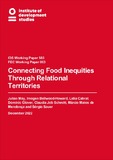Connecting Food Inequities Through Relational Territories

Download
Date
2022-12-19Author
May, Julian Douglas
Bellwood-Howard, Imogen
Cabral, Lídia
Glover, Dominic
Job Schmitt, Claudia
Mendonça, Márcio Matos de
Sauer, Sérgio
Metadata
Show full item recordImpact
Abstract
This paper explores how food inequities manifest at a territorial level, and how food territories are experienced, understood, and navigated by stakeholders to address those inequities. We interpret ‘food territory’ as a relational and transcalar concept, connected through geography, culture, history, and governance. We develop our exploration through four empirical cases: (i) the Cerrado, a disputed Brazilian territory that has been framed and reframed as a place for industrial production of global commodities, to the detriment of local communities and nature; (ii) urban agroecology networks seeking space and recognition to enable food production in the city of Rio de Janeiro, Brazil; (iii) informal food networks forming a complex web of intersecting local and global supply chains in Worcester, a secondary South African city; and (iv) periodic food markets in Ghana that synchronise trade systems across space and time to provide limited profit-making opportunities, but nonetheless accessible livelihood options, for poorer people. Examining these four cases, we identify commonalities and differences between them, in terms of the nature of their inequities and how different territories are connected on wider scales. We discuss how territories are perceived and experienced differently by different people and groups. We argue that a territorial perspective offers more than a useful lens to map how food inequities are experienced and interconnected; it also offers a tool for action.
Citation
May, J.; Bellwood-Howard, I.; Cabral, L.; Glover, D.; Schmitt, C.J.; Mendonça, M.M. de and Sauer, S. (2022) Connecting Food Inequities Through Relational Territories, IDS Working Paper 583, Brighton: Institute of Development Studies, DOI: 10.19088/IDS.2022.087DOI
10.19088/IDS.2022.087Is part of series
IDS Working Paper;583Rights holder
Institute of Development StudiesRights details
http://creativecommons.org/licenses/by/4.0/Sponsor
IDS Strategic Research InitiativeCollections
- IDS Research [1671]
Except where otherwise noted, this item's license is described as This is an Open Access paper distributed under the terms of the Creative Commons Attribution 4.0 International licence (CC BY), which permits unrestricted use, distribution, and reproduction in any medium, provided the original authors and source are credited and any modifications or adaptations are indicated.

